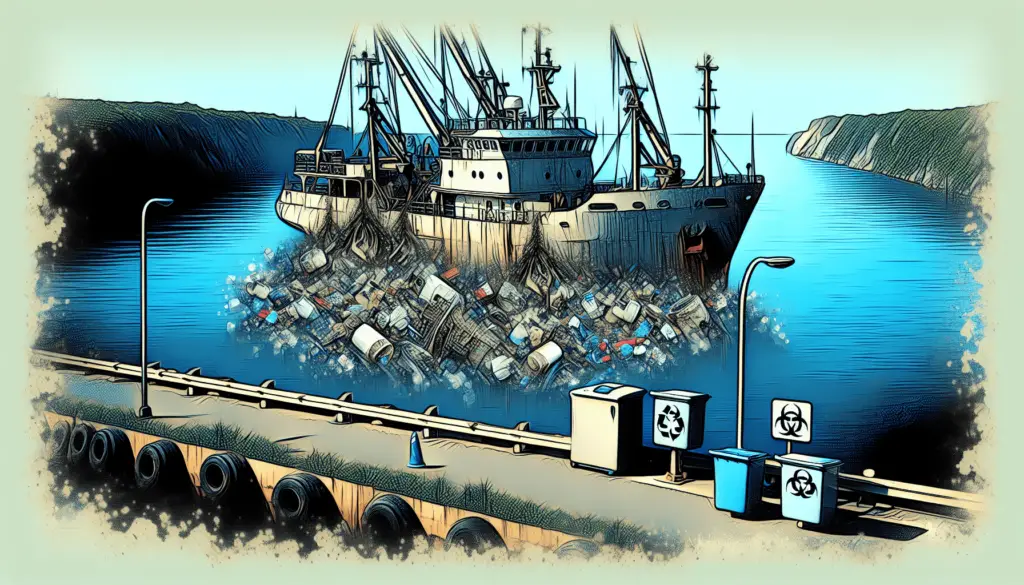Navigating your way around the topic of hazardous boat waste disposal can be as complex as the high seas. It’s an issue frequently overlooked by many people who enjoy spending their free time on the water. However, this environmental concern is as relevant as any other, especially if you’re serious about preserving our oceans. With “Understanding The Disposal Of Hazardous Boat Waste,” you’ll get the low-down on the kinds of waste your vessel might be producing, the negative impacts it could be having, and most importantly, how you should properly dispose of it to maintain harmony between your love for the sea and your responsibility towards it.

Definition of Hazardous Boat Waste
Hazardous boat waste is defined as any material deemed to be harmful to the surrounding environment discarded or emanated from boats. These materials often pose health and environmental risks because of their corrosive, flammable, reactive, or toxic nature.
Types of hazardous boat waste
There are numerous types of hazardous boat waste. Some of these include petroleum products, heavy metals, antifouling paints that contain copper or zinc, excess cleaners or solvents, debris from boat construction or repairs, and even the used batteries from onboard devices.
Characteristics of hazardous boat waste
Hazardous boat wastes are characterized by their ability to cause harm or pose a threat to the environment or living beings. These wastes may be corrosive, toxic, reactive, or flammable. They also persist over time without breaking down, resulting in long-term environmental damage if not appropriately managed.
Potential impacts of hazardous boat waste on marine environment
The potential impacts of hazardous boat waste on the marine environment are numerous and severe. These substances can affect marine life, putting species at risk of extinction. They also result in water pollution, negatively affecting the quality of the water bodies, leading to an overall decline in the aquatic ecosystem’s health.
Categorizing Hazardous Boat Waste
Hazardous substances in boat construction and maintenance
In boat construction and maintenance, various hazardous substances are employed. These include solvents, oil-based paints, antifouling paints, and heavy metals like lead and mercury.
Waste from boat operations
Operations of the boat itself can create hazardous waste. This can be in the form of fuel or oil leakage, waste from on-board toilets, or even the exhaust emissions from the boat’s engine.
Discarded navigational equipment and safety materials
Discarded navigational equipment and safety materials are also classified as hazardous boat waste. These may include electronics, flares, fire extinguishers, and batteries that contain harmful substances.
Regulations Related to the Disposal of Hazardous Boat Waste
International maritime laws and regulations
Numerous international maritime laws aim to regulate boat-related hazardous waste disposal. For instance, regulations outlined in the International Convention for the Prevention of Pollution from Ships (MARPOL) provide extensive guidelines.
National laws and policies
Apart from international treaties and conventions, different countries also have their national laws and policies regarding hazardous boat waste disposal. These laws can vary depending on the country’s specific environmental concerns and its maritime industry’s size.
Penalties for improper waste disposal
Non-compliance with these laws and regulations can lead to severe penalties, including substantial fines, restrictions on future operations, or even imprisonment in extreme cases. The magnitude of the penalties often reflects the degree of environmental damage caused by the improper disposal of hazardous boat waste.
Proper Disposal Processes of Hazardous Boat Waste
Hazardous waste treatment and recycling methods
To minimize the harm caused by hazardous boat waste, waste treatment and recycling methods are employed. These methods can include chemical treatment, solidification, incineration, or recycling materials where possible.
Safe transportation of hazardous wastes
Safe transportation is crucial in the hazardous boat waste disposal process. The Risks during transportation can be minimized using suitable containment method, appropriate labeling, and following the recommended route.
Disposal methods designed for specific types of hazardous waste
Different types of hazardous boat waste call for various disposal methods. For instance, used batteries are best dealt with by recycling programs, while excess cleaning products might need specific waste treatment facilities.

Role of Marine waste Disposal Companies
Services provided by marine waste disposal companies
Marine waste disposal companies play a vital role in managing hazardous boat waste. They provide services such as waste collection, transportation, treatment, and disposal. They may also offer consultancy services to advise boat owners or operators on best practices for waste management.
Certifications and credentials for waste disposal agencies
It’s crucial that marine waste disposal companies hold necessary certifications and credentials to handle hazardous waste. These serve as proof of their competence and commitment to adhering to strict regulations and standards related to waste management.
Impact of professional disposal on the environment
Professional disposal significantly minimizes the environmental impact of hazardous boat waste. Such disposal companies follow stringent processes and guidelines that ensure waste is treated and disposed of in the most environment-friendly way possible.
Alternative Solutions to Hazardous Boat Waste
Green alternatives for boat operation and maintenance
There are environmentally friendlier alternatives to hazardous substances used in boat operation and maintenance. For instance, water-based paints can replace oil-based paints, while organic solvents can serve as an eco-friendly substitute for traditional solvents.
Recycling programs
Recycling programs also provide effective solutions to reduce hazardous boat waste. Such programs enable the reuse of materials such as batteries, metals, and electronics, bringing down the volume of waste that requires disposal.
Eco-friendly boat designs and materials
Eco-friendly boat designs and materials are rising in popularity. They use sustainable materials in their construction and maintenance, significantly reducing hazardous boat waste production.
Preventive Measures Against Hazardous Boat Waste
Best practice in boat operation and maintenance
The best practice in boat operation and maintenance can drastically cut down hazardous boat waste generation. This might involve conducting regular checks for fuel or oil leakage, adequately storing and disposing of waste, or using environmentally friendly alternatives wherever possible.
Educational programs for boat owners and operators
Educational programs can equip boat owners and operators with the necessary skills and knowledge to manage hazardous boat waste properly. They can also raise awareness about the environmental impacts of improper waste management and promote responsible behaviors.
Role of technology in prevention
Technology also plays a valuable role in hazardous boat waste prevention. Innovations such as waste tracking systems or biodegradable materials can help reduce and control the production of such waste.
Case Studies on Hazardous Boat Waste Disposal
Success stories of effective hazardous waste management
Numerous success stories highlight the value of effective hazardous boat waste management. These instances show how adhering to correct procedures, using sustainable alternatives, and employing professional waste disposal services can lead to successful outcomes and minimal environmental damage.
Lessons learned from failure cases
On the other hand, failure cases provide valuable lessons about the consequences of negligence towards hazardous boat waste. They serve as reminders about the importance of compliance with regulations and the need for continuous vigilance and responsibility in waste management.
Current research and development in waste disposal
Current research and development efforts focus on finding innovative ways to handle hazardous boat waste. From improving existing disposal methods to introducing smart technology to track and reduce waste, these developments all aim to boost environmental protection.
Future Perspectives on Hazardous Boat Waste Disposal
Emerging technologies in waste disposal
As technology advances, new opportunities for waste disposal arise. Emerging technologies promise faster, cleaner, and more efficient ways of dealing with hazardous boat waste. This could range from improved recycling methods to smart devices that minimize waste generation.
Trends in policies and regulations
Policies and regulations surrounding hazardous boat waste disposal keep evolving. As society becomes more environmentally conscious, it’s likely we’ll see stricter regulations and policies to protect our marine environments.
Increasing public awareness and engagement
Public awareness and engagement play a significant role in the future of hazardous boat waste disposal. As more people understand the importance of proper waste management, the demand for effective, efficient, and safe waste disposal services will continue to increase.
Conclusion on Hazardous Boat Waste Disposal
Summarizing main points and findings
To sum up, hazardous boat waste poses significant threats to our marine environment. By recognizing its types and characteristics, being aware of the associated laws and regulations, and understanding proper disposal methods, we’re already taking a step in the right direction.
Applying the knowledge in real world situations
Applying this knowledge in real-world situations is critical. This means not only adhering to professional disposal procedures but also exploring environment-friendly alternatives and employing preventive measures.
A call-to-action for better hazardous waste management
We all have a part to play in managing and reducing hazardous boat waste. Whether you’re a boat owner, operator, or simply someone who cares about our environment, it’s crucial to make conscious decisions that support sustainable practices. It’s high time to act for a cleaner, safer marine environment.

